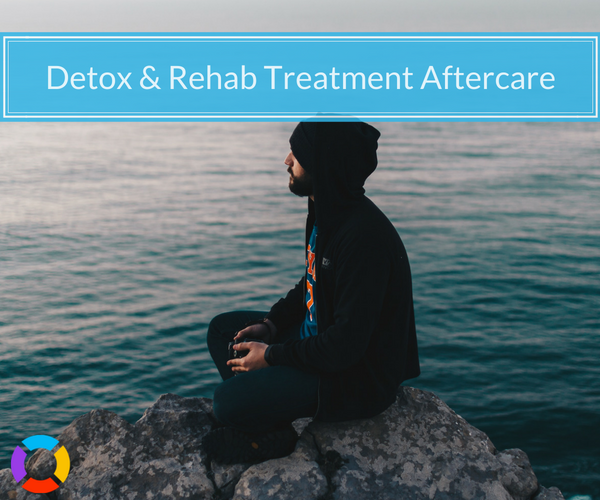Addiction Aftercare Guide + Free Relapse Prevention Worksheet

What is aftercare? Aftercare is the final stage in the continuum of step-down care in addiction treatment. It is the essential conclusion that solidifies lifestyle changes made, through a maintenance sobriety plan.
While aftercare looks different for everyone, it is important to realize long-term addiction recovery is a continuing journey of growth, relapse prevention, peer support and sobriety aftercare.
Why Aftercare Is Essential for Long-Term Recovery
Aftercare isn’t simply an optional add-on to treatment. It’s a crucial part of maintaining the lifestyle changes made during rehab.
- Aftercare offers planning to maintain long-term addiction recovery strategies developed during treatment.
- Relapse statistics indicate the longer you participate in ongoing care, the better your chances for remaining substance free.
- Peer support in recovery groups maintains accountability and creates a new social structure for recovery aftercare.
- Sober living homes create a safe environment for you to learn to live substance free while integrating back into society.
- An aftercare plan that includes outpatient treatment ensures the continuum of care post detox and inpatient programs.
Free Resource: Relapse Prevention Activities Worksheet
Relapse prevention is included as part of rehab treatment either in group therapy or individually with a therapist. It is an essential component in an aftercare plan that studies how your addiction developed.
During group relapse prevention activities, you will find that your warning signs and triggers are similar to other people and you are not alone in your addictive process. These relapse prevention exercises help you identify the warning signs of relapse. They help you develop skills to avoid using substances again.
Using these relapse prevention activities may also help in developing more awareness about your addictive process.
Take the guesswork out of detox. Call today.
These are often used by therapists in aftercare plans for substance abuse treatment. They can be used individually or in a group setting. They can also be used by peer supports who are part of your rehab aftercare program.
Completing these activities and worksheets with other support group members will build accountability and educate others on how to confront behaviors they see in you that are part of your addiction cycle.
Get started here:
This free resource includes journaling prompts, group activities, emergency planning tools, and other helpful tools for relapse prevention.
Types of Aftercare: Common Programs and Support Options
Booster Sessions
Booster sessions are used to refresh skills developed during therapy. They can be short-term individual meetings or group meetings that last several hours or part of a day.
The sessions are designed to review and renew skills learned in cognitive behavioral therapy or other types of treatment. They help review new thought patterns that are working and tweak any challenges to the process of learning to think and feel differently.
Some peer support group conferences offer booster sessions as seminars. Booster sessions can go on for as long as needed in an aftercare plan. These sessions increase positive outcomes in maintaining recovery.
Outpatient Programs
Outpatient programming can include intensive outpatient treatment, telehealth sessions, individual therapy and psychoeducational groups. Your rehab aftercare planning professional will help set up ongoing outpatient treatment for when you leave a rehab facility.
Not sure which aftercare plan is right for you? Help is available.
Individual Therapy
Individual therapy can be used to increase skill development, explore new topics involved in your relapse prevention plan, and to address specific issues related to historical trauma. Meeting one on one with a therapist can help you open up about topics you may not be comfortable discussing in a group setting.
Individual therapy is often covered by insurance for a limited number of sessions per year. Finding a therapist that will meet with you on a sliding scale can help in extending the number of sessions you are able to attend.
Group Therapy
Group therapy is helpful for psychoeducational learning and for peer support recovery activities. It is helpful when you know others are struggling with the same triggers and problems you have.
12 Step & Secular Support Groups
There are many different kinds of peer support groups. Most have workbooks, meet in groups, and provide additional written materials for continued support.
- Alcoholics Anonymous (AA) has inspired the formation of Narcotics Anonymous (NA), and Heroin Anonymous (HA). Long term research supports the effectiveness of these 12 Step programs modified to address specific addictions.
- Celebrate Recovery is a Christian recovery group that uses a 12 step framework similar to AA. It is designed to address all addictions through biblical teachings and faith-based healing. Celebrate Recovery meets in many churches across the world.
- SMART Recovery (Self-Management and Recovery Training) is based on the philosophy of positive self-empowerment. The program focuses on how to become self-reliant to cope with cravings.
- LifeRing Secular Recovery is similar to SMART Recovery and encourages the development of a sober identity.
- Modern Management focuses on reduction of consumption instead of total abstinence and encourages self-control and personal responsibility instead of sobriety.
Sober Living Homes
These residences are sponsored by many treatment centers, churches, mental health programs, and individual providers. The Oxford House system is a template for how sober homes have evolved into self-supporting rental facilities where people can live for a period of time with other people in recovery.
The majority of these sober living homes would not support a Modern Management approach and require total abstinence from drugs and alcohol.
Participants pay their share of rent, work outside the home and also share kitchen and other household duties. The main idea is to support persons learning to reintegrate into society.
Aftercare can help you stay sober. Don’t wait, call now for help.
Holistic Aftercare
Holistic treatment has evolved from Eastern Asian culture through the philosophy of creating harmony with the whole person instead of just addressing compartmentalized symptoms. It is often referred to as complementary and alternative medicine (CAM).
Research supports the slowing down of heart rate, anxiety reduction and the lifting of mood with other physiological and psychological benefits of holistic practices.
Holistic aftercare treatments may include yoga, acupuncture, meditation, massage, exercise, nutritional counseling, and aroma therapy. Some therapies are controversial, such as cold plunges and heat treatments. It is a good idea to consult your medical provider prior to engaging in alternative holistic therapies.
Creating an Aftercare Plan
An aftercare plan is created between you and your therapist, and sometimes with input from your support group. It should be developed prior to leaving inpatient treatment or discharging from an extended outpatient program such as an IOP.

The plan should cover the next six months of your recovery process. Possible elements of your aftercare plan could include:
- Additional inpatient treatment
- Outpatient treatment
- Support groups
- Treatment for dual diagnosis
- Employment or educational goals
- Housing plans/goals
- Medication management
- Ongoing recovery skills development
If you stick to your plan, your chances of staying in recovery increase.
How Long Does Aftercare Last?
Aftercare lasts as long as you want and need it to. Some elements, such as support groups, may continue for a lifetime to provide ongoing care.
Every recovery aftercare plan is personalized and flexible. It can and should change as you progress in your recovery.
Many people extend therapy with professionals, while others may rely on peer support and local community resources. Aftercare entails all the components of your new lifestyle that you are maintaining to support your recovery.
Is Aftercare Expensive? Free and Low-cost Options
Some elements of rehab aftercare may be covered by insurance. But coverage may be limited.
Use the following strategies to explore community resources with your aftercare plan provider to reduce expenses and expand your options.
- Community Behavioral Health Centers (CBHC’s) are funded by state and federal block grants, opioid settlement monies, and state Medicaid funds to provide free services for substance use recovery.
- Sober living is a self-pay option for renting a room with others in recovery. Sharing a house can increase accountability and reduce expenses.
- Support groups like AA, Celebrate Recovery, and other peer-based programs are free.
- Free support groups for families are available through Al-Anon, Alateen, Families Anonymous, and Families of Addicts (FOA).
- Many support group meetings can be attended online if they are not available in your area.
- Local universities and colleges often provide support programming for free to students and their families.
- Search the websites for your county and state to find resources that support sobriety.
The bottom line: Aftercare can be whatever you want it to be, at whatever price you can afford, as long as it is helpful to you.
Examples of Aftercare in Action
Others have achieved success through aftercare, and so can you. Check out these aftercare examples. Learn from individuals in all walks of life, all over the country, how treatment and recovery aftercare changed their lives.



